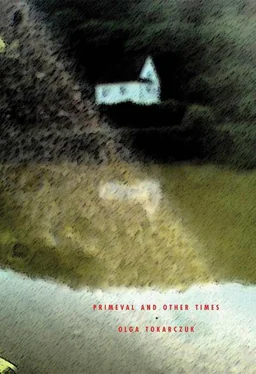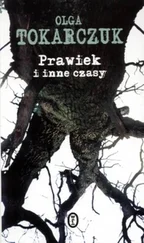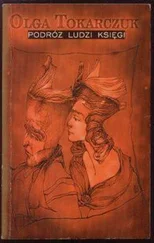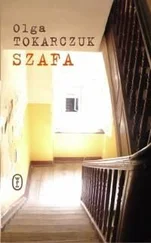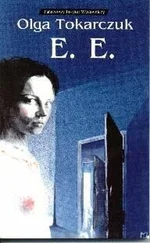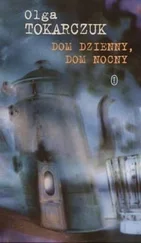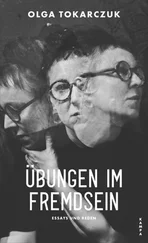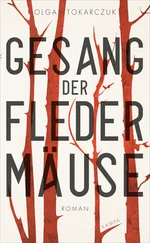“Wait. The house is locked. This place is full of thieves and all sorts of riff-raff.”
He slowly walked after her. Then he took a bunch of keys from his pocket. She watched him open the locks, one, two, three. His hands were shaking. She noticed to her surprise that she was taller than him.
She followed him into the kitchen and at once she smelled the familiar odour of the stove gone cold and burned milk. She inhaled it, like the cigarette smoke.
There were some dirty plates on the table, with flies walking idly about on them. The sun was drawing the pattern of the curtains on the waxed tablecloth.
“Dad, where’s Izydor?”
“I took him to live at the old people’s home in Jeszkotle. He was already old and doddery. Eventually he died. The same thing’s in store for all of us.”
She moved a pile of clothes from a chair and sat down. She felt like crying. Clods of earth and dry grass had stuck to her high heels.
“There’s no need to feel sorry for him. They gave him proper care and full board. He was better off than I am. I have to see to everything, keep an eye on it all.”
She stood up and went into the living room. He lumbered after her, not letting her out of sight. On the table she saw a pile of underwear that had gone grey: vests, underpants and knickers. On a newspaper there was an ink-pad and a seal with a wooden handle. She picked up a pair of underpants and read the print fuzzily stamped in ink: “Paweł Boski, Inspector.”
“They steal,” he said. “They even take underpants off the washing line.”
“Dad, I’ll stay here with you for a bit, I’ll clean up for you and bake a cake…” Adelka took off her coat and hung it on a chair.
She pulled up the sleeves of her sweater and began to clear the dirty cups from the table.
“Leave it.” Paweł’s tone was unexpectedly harsh. “I don’t want anyone acting as though they own the place. I can manage fine.”
She went into the yard for her suitcase, and then put some presents on the dirty table: a cream-coloured shirt and a tie for her father, a box of chocolates and some eau de Cologne for Izydor. For a while she held a photograph of her daughter.
“This is my daughter. Do you want to see?”
He took the photograph and cast an eye at it.
“She doesn’t look like anyone. How old is she?”
“Nineteen.”
“What have you been doing all this time?”
She took a deep breath, because she thought she had a lot to say, but suddenly it all flew out of her head.
Paweł picked up the presents in silence and took them to the sideboard in the living room. The bunch of keys jangled. She heard the rattle of patent locks forcibly set into the oak door of the sideboard. She looked around the kitchen and recognised things she had already forgotten. On a rack by the tiled stove there was a plate with a double bottom, where hot water was poured, so the soup wouldn’t go cold too quickly. On a shelf there were some ceramic containers with blue lettering saying flour, rice, buckwheat, and sugar. For as long as she could remember the container for sugar had been cracked. There was a copy of the icon of the Virgin Mary of Jeszkotle hanging above the living-room door. Her lovely hands alluringly exposed her smooth neckline, but where there should have been a breast there was a small, blood-red piece of flesh – a heart. Finally Adelka’s gaze landed on the coffee grinder with the porcelain belly and the neat little drawer. From the living room she heard the keys rattling as they opened the locks in the sideboard. She hesitated a moment, then quickly took the grinder from the shelf and hid it in her suitcase.
“You’ve come back too late,” said her father in the doorway. “Everything’s already over. Time to die.”
He laughed, as if he had told an excellent joke. She saw that there was nothing left of his fine white teeth. Now they sat in silence. Adelka’s gaze wandered along the pattern on the tablecloth and rested on some jars of blackcurrant juice that the fruit flies had got inside.
“I could stay…” she whispered, and the ash from her cigarette fell on her skirt.
Paweł turned to face the window and gazed through the dirty pane at the orchard.
“I don’t need anything anymore. I’m not afraid of anything anymore.”
She understood what he was trying to say to her. She got up and slowly put on her coat. She kissed her father awkwardly on both stubble-frosted cheeks. She thought he would see her to the gate, but at once he headed for the pile of rubble, where his stool was still standing.
She emerged onto the Highway, and only then did she notice that it had been surfaced in asphalt. The lime trees seemed smaller. Light gusts of wind were shaking the leaves off them, which were falling on Stasia Papuga’s fields, overgrown with tall grass.
By Wodenica she wiped her Italian heels clean with a handkerchief and tidied her hair. She had to sit at the stop for another hour or so, waiting for the bus. When it came, she was the only passenger. She opened her case and took out the grinder. Slowly she began to turn the handle, and the driver cast her a look of surprise in the rear-view mirror.
Olga Tokarczuk was born in 1962 in Sulechów near Zielona Góra, Poland. A recipient of all of Poland’s top literary awards, she is one of the most critically acclaimed authors of her generation. After finishing her psychology degree at the University of Warsaw, she initially practised as a therapist and often cites C.G. Jung as an inspiration for her work, in which mythmaking has become a hallmark.
Since the publication of her first book, a collection of poems, in 1989, Tokarczuk has published collections of stories, novellas, novels, and one book-length essay. Her novel House of Day, House of Night has been translated into English. Awarded the Nike Prize, Poland’s top book award, for Bieguni [The Runners] in 2008, she now divides her time between Wrocław and a small village near the Czech border.
Antonia Lloyd-Jones is among the leading translator of Polish prose into English. Having studied Russian and Ancient Greek at Oxford University, she has translated many works of Polish fiction, among them House of Day, House of Night by Olga Tokarczuk and Pawe ł Huelle’s Mercedes-Benz and Castorp . She is the recipient of the 2009 Found in Translation Award for her translation of Huelle’s The Last Supper . She lives in London.
Twisted Spoon Press
Prague
Copyright © 1992, 1996, 2000 by Olga Tokarczuk
English translation copyright © 2010 by Antonia Lloyd-Jones
Copyright © 2010 by Twisted Spoon Press
All rights reserved. This book, or parts thereof, may not be used or reproduced in any form, except in the context of reviews, without written permission from the publisher.
This publication has been funded by the Book Institute – the ©POLAND Translation Program
Originally published in Polish as Prawiek i inne czasy in 1996 by WAB, Warsaw. The version used for this translation was published in 2000 by Wydawnictwo Ruta, Wałbrzych
Cover image by Markéta Vogelová
Design by Jed Slast
Published in English in 2010 by Twisted Spoon Press
P.O. Box 21 – Preslova 12, 150 21 Prague 5, Czech Republic
www.twistedspoon.com
ISBN 978-80-86264-35-6 (softcover)
ISBN 978-80-86264-64-6 (e-book)
